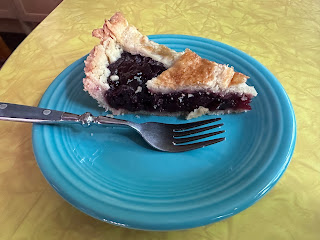"The point of the experiment was to create a protected past or 'protected time.' A time shelter. We wanted to open up a window into time and let the sick live there, along with their loved ones."
Gaustine, with the assistance of the narrator, 'Georgi Gospodinov', is looking to create a therapeutic safe space for those suffering from Alzheimer's disease. If the sufferer's happy time was in the 1960s, for example, they'll be treated in a wing of the clinic furnished like the 60s, with the furniture, the music, the cigarettes (there's a lot of talk about the cigarettes of different eras) and whatever else will be most effective. Gaustine is the clinical psychologist (though is he?) and 'Gospodinov', a Bulgarian novelist, is the presumed expert in telling the stories of the needed era.
That's the premise of Georgi Gospodinov's novel Time Shelter, which came out earlier this year in English, translated by Angela Rodel, and recently won the Man Booker International. If you've read other Gospodinov, you'll know that Gaustine is a recurring character in his fiction and has a way of moving from time to time at will.
But that's only the first section (of five). Gaustine sets up his clinic, in Switzerland, at least partly under the influence of Mann's The Magic Mountain, and we get the case history of the first two patients, one a dissident in Bulgaria in the 60s, and the second a woman who was a child during World War II. The therapy seems to help, family members are impressed, though of the second one, the 'Gospodinov' character says, "She's remembering, I say, that's why she's crying." Is a doubt creeping in for the reader?
In the second section, the treatment is so successful that even people who do not have Alzheimer's are eager to move to Gaustine-style clinics. (Others than the first in Switzerland are now open.) Whole countries are eager to move to a different point in time. But when? The various E.U. nations decide each will hold a referendum to determine their preferred era. The U.K. wants to join in as well, but the E.U. says, no, you've already left, and anyway, wasn't Brexit a referendum about to moving to an imagined earlier era? Switzerland wants to join in as well, and is allowed, but in the end punts due to their traditional neutrality.
The third section is a case of study of one referendum, that in Bulgaria. (Naturally enough for our Bulgarian author.) None of the countries are seriously considering anything prior to 1900, but what's the best decade in Bulgaria in the 20th century? There are partisans for most decades, but the polls show that it comes to two: the 80s, the stagnant but relatively safe end of the communist era and the 30s, Bulgarian nationalism at its most successful. (In the 20s in Bulgaria there was apparently a military coup, and fighting broke out for a couple of years.) Which will win? The Socs? or the Heroes? Polls show it's close.
The fourth section is a swift overview of the referendum outcomes across Europe. Europe is divided into camps. The 70s are popular, as are the 50s. Only Italy chooses the 60s, la dolce vita, don't you know? Will anybody actually choose the 40s? Things were pretty good then in Sweden for instance.
The E.U. (and Gospodinov the author) take the terms of these referenda seriously: if you've moved to the 80s, do you have to get rid of your cellphones? If to the 30s, do you have also get rid of your televisions? Travel across country lines is forbidden until these questions are sorted. Europe is once again broken into camps, but on different lines.
In the last section, 'Georgi Gospodinov' is losing his memory (or is he?) and in need of treatment. What's his preferred era? Gaustine writes,
"While writing a novel about those who have lost their memory, he himself begins to lose his memory. He rushes to finish it before he forgets what he was writing."
Can I say I think the novel is silly and also still say, I think it's a pretty major novel? Perhaps I should say absurd, a better lit-critty term, but that word comes with a lot of baggage and feels more ponderous than Time Shelter actually is. The whole premise is silly, but it's quite an inspired and suggestive silliness. And, as befits a novel about aging and losing one's memory, there's also a strong streak of melancholy throughout, most pronounced at the end.
[One thing it's not, though, is 'macabre', which was part of the description of the novel when it appeared on the Man Booker International shortlist, and is just absurd. Or silly.]
So: a novel about our relationship to the past, to history, to memory, to Europe. Maybe some other things, too. In a funny, serious package. At this point I haven't read any other of the Man Booker International shortlist novels, but this seems a solid choice.
I've liked Gospodinov in the past. Some other Gospodinov
books on the blog.
A few other quotes that didn't quite fit in anywhere else, but I liked: 😉
"For a Bulgarian, complaining is like talking about the weather in England, you can never go wrong."
"I...sink into the cold cave of the library as if into another time, a time shelter."
"The less memory, the more past.
As long as you remember, you hold at bay the times gone by. Like lighting a fire in the middle of a forest at night. Demons and wolves are crowding all around, the beasts of the past are tightening the circle, but still they don't step into it. The allegory is simple. As long as the flame of memory burns, you are the master."
"The end of a novel is like the end of the world, it's good to put it off."
































